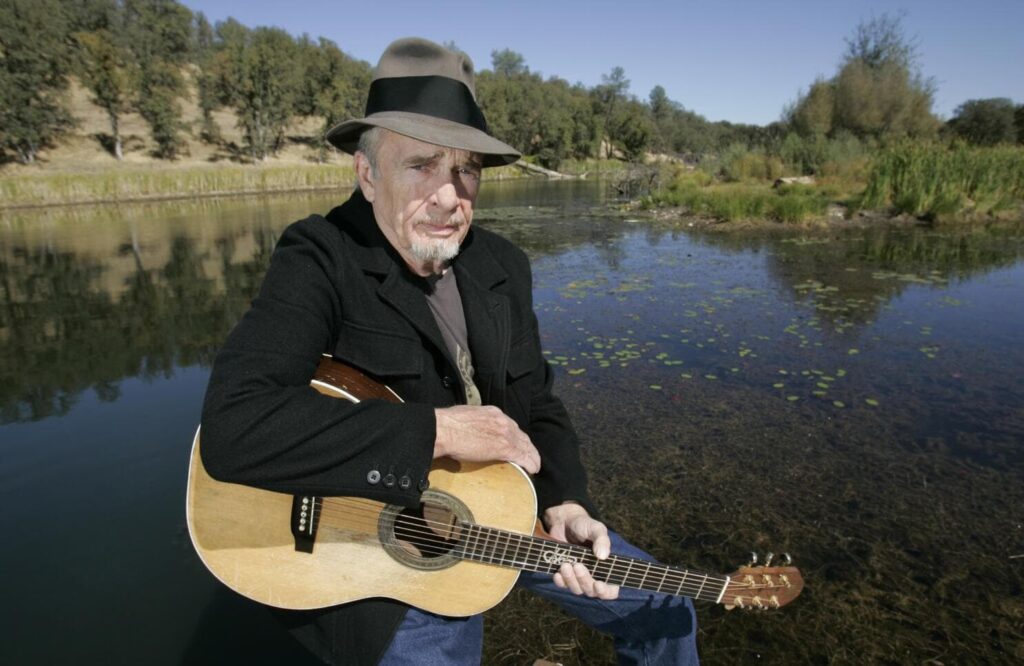
A bittersweet farewell, a grieving gaze at a dried-up river of memory.
In the twilight of his life, Merle Haggard recorded what would become his final song: “Kern River Blues.” Unlike a triumphant closing note, this track is a quiet confession — a nostalgic reflection on Bakersfield, lost waters, and the slow fade of time.
Recorded on February 9, 2016, just a couple of months before his death, “Kern River Blues” premiered posthumously on SiriusXM’s Willie’s Roadhouse on May 12, 2016. The song was released shortly afterward via iTunes and on Haggard’s website, with 10% of all gross proceeds going to homeless charities — a humble gesture that mirrors the depth of his character.
Although “Kern River Blues” was not released as part of a traditional album when it first came out — being a posthumous single — its legacy is entwined with one of Haggard’s most haunting earlier works: the 1985 song “Kern River”, which was the title track of his Kern River album. That album reached No. 8 on the Billboard Country Albums chart, marking it as a significant entry in his vast discography. Meanwhile, the original “Kern River” single climbed to No. 10 on the Billboard Hot Country Singles chart.
The story behind “Kern River Blues” is tender and haunting. In his final weeks, Merle Haggard, weakened by pneumonia, still found the will to walk across the road to his home studio and record what he knew might be one of his last songs. The lyrics are steeped in memory: his voice, frail but honest, recalls leaving Bakersfield in the late ’70s, watching the city fade out the window, and remembering how the Kern River used to run “deep and wide.” But in Haggard’s reflection, something more sorrowful emerges — “someone stole the water, another politician lied.” It’s not just a river that has dried up; it’s a dream, a place of youthful love, of home, of possibility.
He sings of kissing an old boxcar goodbye, of digging his blues in that river, only to find that the river itself is dry. The music underneath is deceptively simple — a shuffling Jimmie Rodgers–style blues rhythm, with Haggard joined by his son Ben Haggard on guitar, backed by longtime collaborators including Norm Hamlet on steel guitar. The production feels deeply intimate, as though he invited us into his memory, into his final farewell.
There is no swagger here, no bravado. Instead, there is a resigned wisdom. As he looks into the past, he also seems to be looking outward — acknowledging how much has changed, and mourning not just the river, but the spirit of the place he once called home. Critics and fans alike have described the song as a “final bow,” a summoning of memory and mortality.
The meaning of “Kern River Blues” is layered, but at its heart it is about loss — not only personal loss, but the loss of a world. The Kern River, for Haggard, is a symbol: once alive, powerful, full of possibility, now diminished. The drying river becomes a metaphor for time slipping away, for places that once held meaning fading into memory. He reminisces on leaving Bakersfield, but also on what was taken: water, innocence, perhaps even his own identity as the landscape changed around him.
In many ways, the song is autobiographical, but it isn’t merely a looking back at youth. It’s also deeply political. The line about water being stolen and a politician lying resonates with one of Haggard’s recurring themes — the common man’s struggle, the betrayal of big systems, and a sense that progress doesn’t always mean justice. Yet, the delivery is not angry; it is mournful, reflective, and full of longing.
There is also a more universal appeal: for anyone who has seen their hometown grow and change, for anyone who remembers a love or a simpler time, the song taps into the melancholy of watching the world shift beneath you. Haggard’s voice, weathered by years, carries the weight of those memories, and invites the listener in — not to a spectacle, but to a gentle, aching remembrance.
As his final recorded song, “Kern River Blues” stands as a deeply personal testament. It’s not a flashy last single, but a whisper of farewell — the voice of a man who built his career on stories of working-class life, heartache, and redemption, now reflecting on his own journey with unguarded honesty.
To the older soul listening, this song feels like touching an old photograph: familiar, worn around the edges, but very real. You can almost feel the dust in the air, the heat of the dry riverbank, the memory of laughter long gone. It is, in its own way, a homecoming, one final time — not to the place he left, but to the place he never really left in his heart.
And that is the quiet power of Merle Haggard’s last bow: he hands us his memories, his regrets, his farewell — and in doing so, he reminds us of our own.